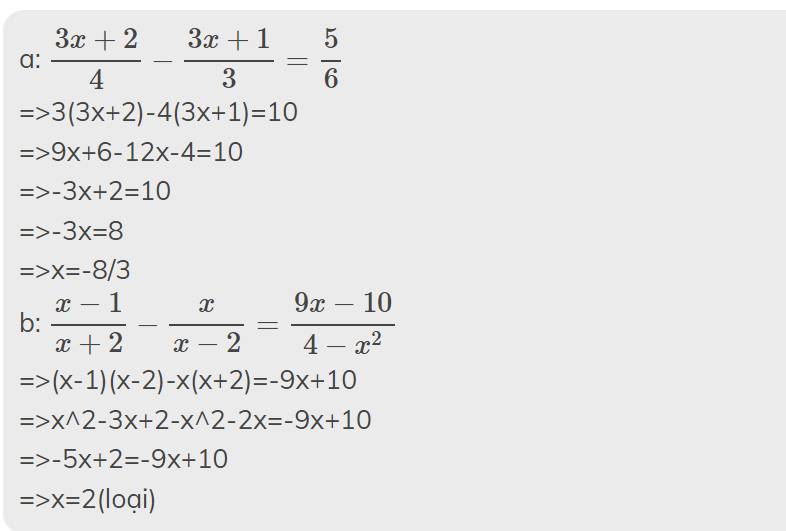Hãy nhập câu hỏi của bạn vào đây, nếu là tài khoản VIP, bạn sẽ được ưu tiên trả lời.

=> 72 - 20x - 36x - 84 = 30x - 240 - 6x + 84
=> (72 - 84 ) - (20x + 36x ) = (30x - 6x ) - 240 + 84
=> -12 - 56x = 24x - 156
=> -12 + 156 = 24x + 56x
=> 144 = 80x
=> x = 144 : 80
=> x = 9/5

Ta có:
(2 - 3x)(x + 8) = (3x - 2)(3 - 5x)
⇔ (2 - 3x)(x + 8) - (3x - 2)(3 - 5x) = 0
⇔ (2 - 3x)(x + 8) + (2 - 3x)(3 - 5x) = 0
⇔ (2 - 3x)(x + 8 + 3 - 5x) = 0
⇔ (2 - 3x)(11 - 4x) = 0
⇔ 2 - 3x = 0 hay 11 - 4x = 0
⇔ 2 = 3x hay 11 = 4x
⇔ x = \(\dfrac{2}{3}\) hay x = \(\dfrac{11}{4}\)
Vậy tập nghiệm của pt S = \(\left\{\dfrac{2}{3};\dfrac{11}{4}\right\}\)
<=> (2-3x ) (x+8) + (2-3x ) (3-5x)=0
<=> (2-3x ) ( x+8 + 3-5x ) =0
<=> (2-3x ) ( 11 - 4x ) = 0
=> 2-3x =0 hoặc 11-4x =0
3x = 2 4x =11
x = 2/3 x = 11/4

\(1,\dfrac{3x+2}{6}-\dfrac{3x-2}{4}=\dfrac{15}{8}\\ \Leftrightarrow\dfrac{4\left(3x+2\right)}{24}-\dfrac{6\left(3x-2\right)}{24}-\dfrac{45}{24}=0\\ \Leftrightarrow12x+24-18x+12-45=0\\ \Leftrightarrow-6x-9=0\\ \Leftrightarrow x=-\dfrac{3}{2}\)
2, ĐKXĐ:\(x\ne\pm3\)
\(\dfrac{x+2}{3+x}-\dfrac{x}{3-x}=\dfrac{8x-6}{9-x^2}\\ \Leftrightarrow\dfrac{\left(x+2\right)\left(3-x\right)}{\left(3+x\right)\left(3-x\right)}-\dfrac{x\left(3+x\right)}{\left(3+x\right)\left(3-x\right)}-\dfrac{8x-6}{\left(3+x\right)\left(3-x\right)}=0\\ \Leftrightarrow\dfrac{-x^2+x+6-3x-x^2-8x+6}{\left(3+x\right)\left(3-x\right)}=0\\ \Leftrightarrow-2x^2-10x+12=0\\ \Leftrightarrow x^2+5x-6=0\\ \Leftrightarrow\left(x-1\right)\left(x+6\right)=0\\ \Leftrightarrow\left[{}\begin{matrix}x=1\left(tm\right)\\x=-6\left(tm\right)\end{matrix}\right.\)
\(a,\dfrac{3x+2}{6}-\dfrac{3x-2}{4}=\dfrac{15}{8}\)
\(\Leftrightarrow4\left(3x+2\right)-6\left(3x-2\right)=45\)
\(\Leftrightarrow12x+8-18x+12=45\)
\(\Leftrightarrow12x-18x=45-12-8\)
\(\Leftrightarrow-6x=25\)
\(\Leftrightarrow x=\dfrac{-25}{6}\)
Vậy \(S=\left\{\dfrac{-25}{6}\right\}\)
\(b,\dfrac{x+2}{3+x}-\dfrac{x}{3-x}=\dfrac{8x-6}{9-x^2}\left(ĐKXĐ:x\ne3;x\ne-3\right)\)
\(\Leftrightarrow\left(x+2\right)\left(3-x\right)-x\left(3+x\right)=8x-6\)
\(\Leftrightarrow3x-x^2+6-2x-3x-x^2=8x-6\)
\(\Leftrightarrow-x^2-x^2+3x-2x-3x-8x=-6+6\)
\(\Leftrightarrow-2x^2-10x=0\)
\(\Leftrightarrow-2x\left(x-5\right)=0\)
\(\Leftrightarrow\left[{}\begin{matrix}-2x=0\\x-5=0\end{matrix}\right.\Leftrightarrow\left[{}\begin{matrix}x=0\left(nhận\right)\\x=5\left(nhận\right)\end{matrix}\right.\)
Vậy \(S=\left\{0;5\right\}\)

\(\left(x-3\right)^2+\frac{1}{2}=\left(x-1\right)\cdot\left(x+1\right)\)
\(x^2-6x+9+\frac{1}{2}=x^2-1\)
\(x^2-6x+9\frac{1}{2}=x^2-1\)
\(x^2-6x-x^2=-1-9\frac{1}{2}\)
\(\left(x^2-x^2\right)-6x=-10\frac{1}{2}\)
\(-6x=-10\frac{1}{2}\)
\(x=-10\frac{1}{2}:\left(-6\right)\)
\(x=1\frac{3}{4}\)
(x-3)^2 +1/2= (x-1)*(x+1)
\(\Leftrightarrow x^2-6x+\frac{19}{2}=x^2-1\)
\(\Leftrightarrow x^2-6x+\frac{19}{2}-x^2+1=0\)
\(\Leftrightarrow\left(x^2-x^2\right)+\frac{19}{2}+1-6x=0\)
\(\Leftrightarrow\frac{21}{2}-6x=0\)
\(\Leftrightarrow\frac{21}{2}-\frac{12x}{2}=0\)
\(\Leftrightarrow-\frac{3\left(4x-7\right)}{2}=0\)
\(\Leftrightarrow3\left(4x-7\right)=0\)
\(\Leftrightarrow4x-7=0\)
\(\Leftrightarrow4x=7\)
\(\Leftrightarrow x=\frac{7}{4}\)

Ta có: \(\left(3x-1\right)\left(2x+7\right)-\left(x+1\right)\left(6x-5\right)=\left(x+2\right)-\left(x-5\right)\)
\(\Leftrightarrow6x^2+21x-2x-7-6x^2+5x-6x+5=x+2-x+5\)
\(\Leftrightarrow18x-2=7\)
\(\Leftrightarrow18x=9\)
hay \(x=\dfrac{1}{2}\)

\(1,4x\left(1-x\right)-8=1-\left(4x^2+3\right)\\ \Leftrightarrow4x-4x^2-8=1-4x^2-3\\ \Leftrightarrow4x-4x^2-8-1+4x^2+3=0\\ \Leftrightarrow4x-6=0\\ \Leftrightarrow x=\dfrac{3}{2}\)
\(2,\left(2-3x\right)\left(x+11\right)=\left(3x-2\right)\left(2-5x\right)\\ \Leftrightarrow\left(2-3x\right)\left(x+11\right)-\left(2-3x\right)\left(5x-2\right)=0\\ \Leftrightarrow\left(2-3x\right)\left(x+11-5x+2\right)=0\\ \Leftrightarrow\left(2-3x\right)\left(-4x+13\right)=0\\ \Leftrightarrow\left[{}\begin{matrix}x=\dfrac{2}{3}\\x=\dfrac{13}{4}\end{matrix}\right.\)

= x3 + 33 -x(x2 -1) -27 =0 ( tổng các lập phuong)
x =0
CX100%

\(\Leftrightarrow x^2-6x+9-x^2+4=1\)
=>-6x=-12
hay x=2